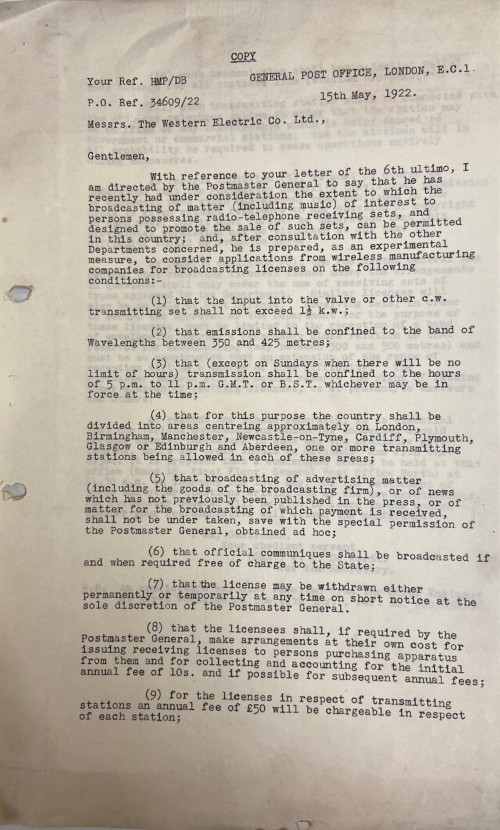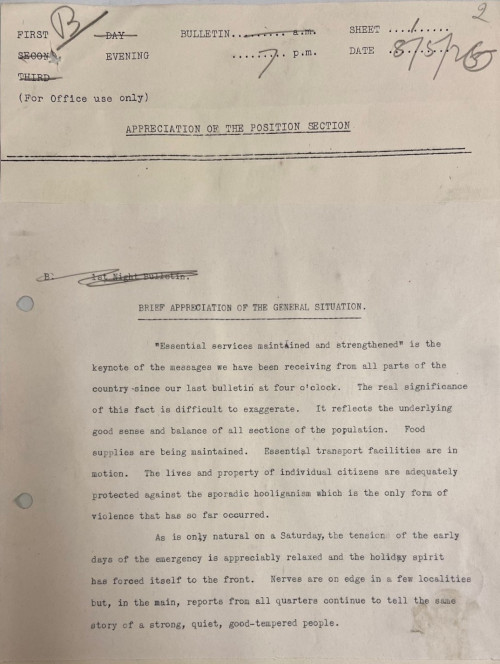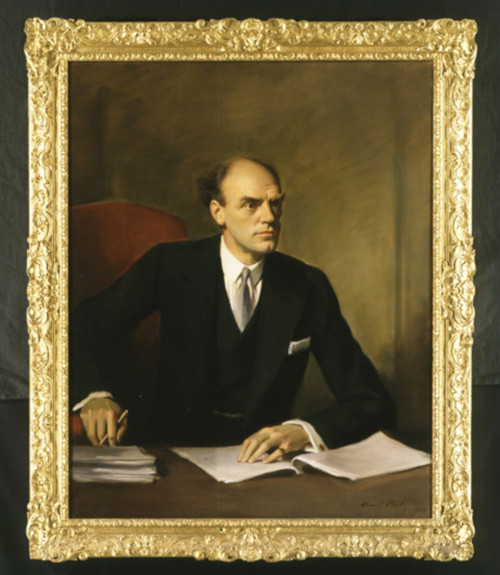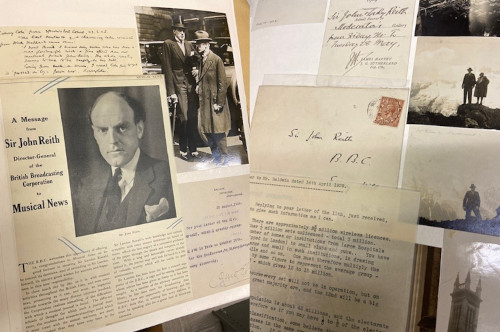Archives Hub feature for November 2022
The BBC is celebrating its centenary this year and the BBC Written Archives Centre in Caversham holds the documents that chronicle the Corporation’s contribution to the cultural history of the UK.
Rather than try and cover all 100 years in one post (you can see our selection of 100 objects here) I have picked out a couple of collections that come right at the beginning of the BBC’s story.
The Company Papers: from Company to Corporation
It’s hard to imagine a world without broadcast media, but in early 1922 the UK’s General Post Office (GPO) and a group of wireless manufacturers were busy negotiating how a nationwide system for wireless broadcasting on a large scale could be implemented and funded.

These discussions resulted in the formation of the ‘British Broadcasting Company’, the BBC’s predecessor before it was established under a Royal Charter in 1927. The commercial company was granted a licence to broadcast by the GPO, funded by royalties from the sales of wireless sets from approved manufacturers. The Company was formed on 18th October 1922, registered on 15th December 1922 and received its Licence from the Post Office on 18th January 1923.
Daily broadcasts began on 14th November 1922 from Marconi House on the Strand. The regular programme on the 2LO London station included music, drama and ‘talks’ for several hours each day. Licences to receive the broadcasts could be obtained for 10 shillings.
There was soon debate about the relationship between the newly formed Company and the government. This came to a head with the General Strike in 1926, which opened up the possibility that the government could use the BBC as a means of promoting its own views. The Company managed to maintain its impartiality while covering the crisis, broadcasting from the point of the view of the strikers and the government, which appealed to the general public.
Partly as a result of navigating the right tone for the strike and partly via the outcome of two committees to review the new medium of radio broadcasting (Sykes Committee in 1923 and Crawford Committee in 1925) the British Broadcasting Company was reorganised as a public service to become the British Broadcasting Corporation on 1st January 1927.
The papers in the archive for series CO1 cover the Company’s formation and organisation, including correspondence with the radio trade, politicians, and the press. The files, which include discussions around the first programme content and the tensions brought about by the General Strike, provide a fascinating glimpse into the origins of an organisation that is now so well-known.
Reith Diaries: the Founder of the BBC
John Reith (later Sir John Reith, and subsequently 1st Baron Reith of Stonehaven) became the first General Manager of the British Broadcasting Company in 1922 and the first Director-General of the Corporation from 1927 to 1938. His name has become so connected with the style and output of the BBC through his mission to ‘inform, educate and entertain’ that the term ‘Reithian’ has come to describe these principles of broadcasting.
Born in 1889, Reith was son of a Scottish minister. He trained and worked as an engineer and factory manager, spending two years in America and serving as a lieutenant in the First World War. He successfully applied for the post of General Manager of the British Broadcasting Company in 1922, when there was little thought as to the direction it should take. This was to become the start of Reith’s ideas of broadcasting as a force for social good, with an intrinsically moral tone.
Having led the BBC through its formation as a Corporation, the introduction of overseas services and the launch of television, Reith resigned in 1938. He was involved in a number of high positions in government and as a chairman of several organisations before his death in 1971.
The archive holds Reith’s personal papers as a Special Collection. Most notable are his diaries, which span from 1911 to his death. The volumes are a mixture of typed and handwritten material and cover Reith’s personal thoughts and decisions on both the business and domestic sides of his life, including the key events of his time at the BBC.
Alongside the diaries are a collection of enclosure volumes, known as scrapbooks. These contain Reith’s hand-picked mementoes of his life and include letters, press cuttings and ephemera such as postcards and greetings cards. They help to provide a more personal portrait of Reith, who is so often associated purely with his working life.
All of this material combines with everything in the written archives to provide extra context to well-known stories and increase our understanding of how past events shaped the BBC.
Further Information
Collection level descriptions for the BBC Broadcasting Company Papers and the Reith Special Collection are available to view on the Archives Hub:
- BBC Company: https://archiveshub.jisc.ac.uk/data/gb898-bbc
- Reith Collection: https://archiveshub.jisc.ac.uk/data/gb898-acq
Descriptions listing individual files will soon be available via the BBC Written Archives Centre’s in-house catalogue, which is currently in development.
The BBC Written Archives Centre is available to visit by appointment if you are carrying out an academic or commercial project.
- Full visitor details available at: https://www.bbc.co.uk/archive/bbc-written-archives-centre/zdy9scw
For further information on the BBC centenary:
- BBC 100: https://www.bbc.co.uk/100
- BBC Archives: https://www.bbc.co.uk/archive/
Matthew Chipping
Archive Collections Manager (WAC Catalogue)
BBC Written Archives Centre
Related
Browse the BBC Written Archives Centre descriptions to date on Archives Hub
All images copyright the BBC. Reproduced with the kind permission of the copyright holders.




